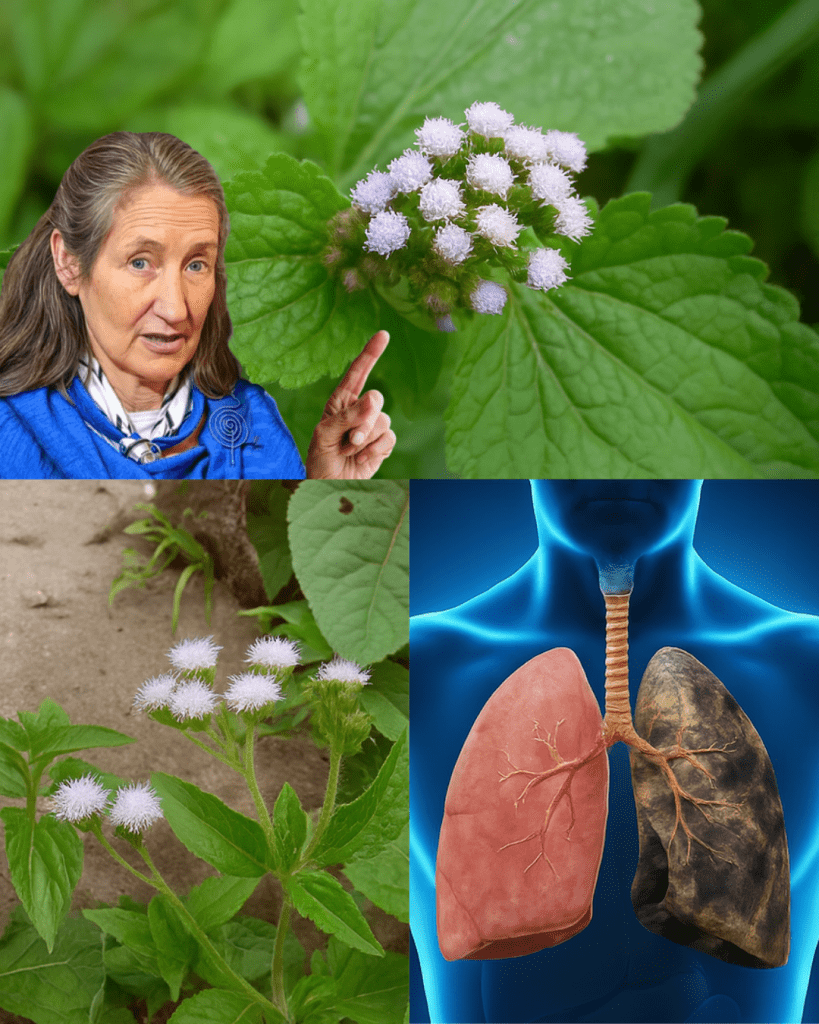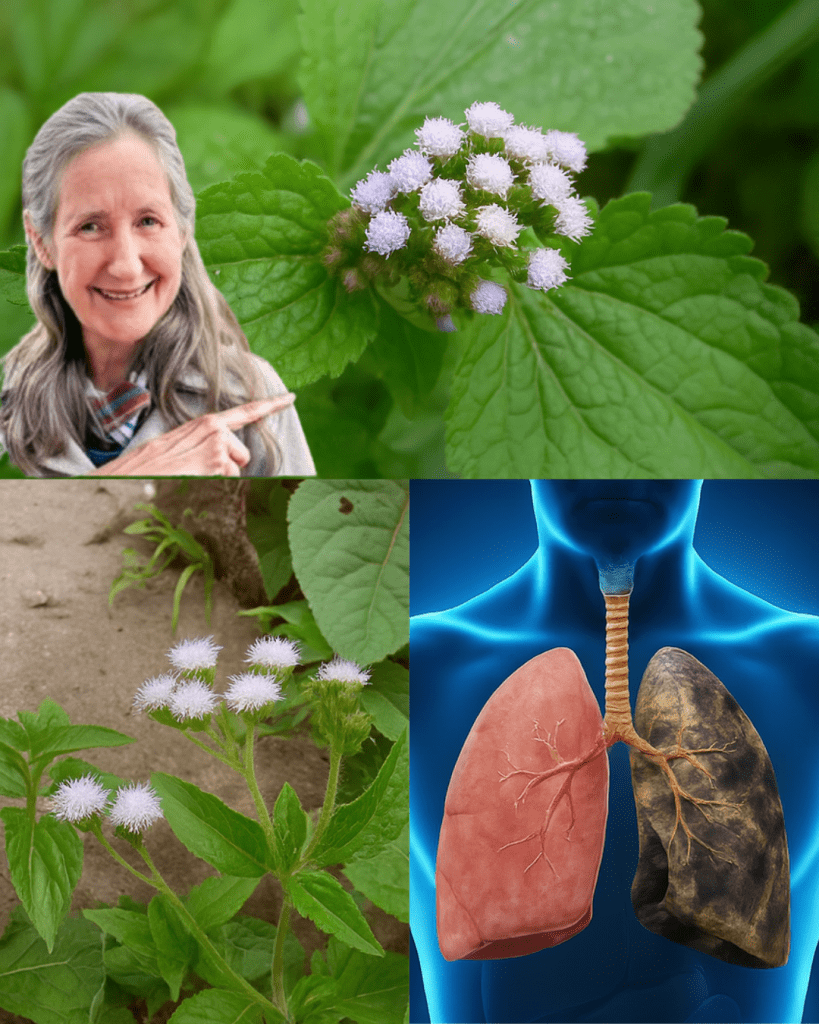Have you ever walked past a patch of unassuming weeds and wondered if they hold hidden treasures? Ageratum conyzoides, commonly known as billygoat weed, is one such plant—a humble herb with a powerhouse of medicinal and agricultural potential. Native to Tropical America but thriving globally, this aromatic plant has been a cornerstone of traditional medicine for centuries. If you’re curious about natural remedies or sustainable gardening, billygoat weed might just become your new obsession. From healing wounds to repelling pests, let’s explore 15 incredible benefits of this versatile plant and how you can harness its magic safely and effectively.

What Is Ageratum conyzoides? Nature’s Overlooked Gem
Ageratum conyzoides, part of the Asteraceae family, is an annual herb that grows up to 1 meter tall with soft, hairy stems and ovate leaves. Its small, fluffy flowers—white, pink, or mauve—add a touch of charm, but its real value lies in its phytochemical richness. Packed with flavonoids, alkaloids, terpenoids, and chromenes, this plant is a staple in folk medicine across Africa, Asia, and South America. Despite its reputation as an invasive weed, its benefits are undeniable, making it a must-know for health enthusiasts and eco-conscious gardeners.
Why should you care? Billygoat weed’s versatility spans healing ailments, protecting crops, and even improving soil health. But it’s not without risks—proper use is key to unlocking its potential safely. Ready to discover its secrets? Let’s dive in.
15 Remarkable Benefits of Ageratum conyzoides
Billygoat weed’s reputation as a medicinal and agricultural powerhouse is backed by both tradition and science. Here are 15 incredible benefits that make it a standout:
1. Accelerates Wound Healing
The leaves of Ageratum conyzoides are renowned for their wound-healing properties. Studies show methanol and aqueous extracts promote faster recovery in cuts and burns, often outperforming conventional treatments like Vaseline gauze.
2. Fights Bacterial Infections
With antibacterial activity against pathogens like Staphylococcus aureus and Escherichia coli, billygoat weed is a natural antimicrobial. Its extracts can combat infections, making it a go-to for skin and systemic issues.
3. Combats Fungal Pathogens
The plant’s secondary metabolites, like chromenes and flavonoids, suppress fungi such as Candida and Aspergillus. This makes it a promising candidate for natural antifungal remedies.
4. Reduces Inflammation
Flavonoid-rich extracts of billygoat weed have potent anti-inflammatory effects, reducing pain and swelling in conditions like arthritis and rheumatism. Clinical trials in Brazil reported pain relief in 66% of arthritis patients.
5. Relieves Pain
Its analgesic properties make it effective for headaches, menstrual cramps, and joint pain. Aqueous extracts have shown significant pain relief in animal studies.
6. Treats Malaria
In Nigeria and Uganda, leaf decoctions are traditionally used to combat malaria. Research supports its efficacy against Plasmodium parasites, offering a natural alternative to synthetic drugs.
7. Eases Digestive Issues
Billygoat weed is used to treat diarrhea, dysentery, and colic. Its antispasmodic effects soothe gastrointestinal discomfort, making it a staple in African and Asian herbal remedies.
8. Acts as a Natural Insect Repellent
The plant’s insecticidal properties, driven by precocene compounds, repel pests like mosquitoes and moths. It’s a natural choice for protecting crops and homes.
9. Controls Bleeding
Aqueous leaf extracts have hemostatic effects, reducing bleeding time in wounds. This supports its traditional use as a bandage for cuts and scratches.
10. Supports Skin Health
From eczema to fungal infections, billygoat weed’s antimicrobial and anti-inflammatory properties make it a go-to for skin conditions. Leaf poultices are commonly used in Malaysia and Nigeria.
11. Alleviates Respiratory Issues
Decoctions of the whole plant are used to treat asthma, pneumonia, and sore throats, thanks to its antispasmodic and anti-inflammatory effects.
12. Promotes Women’s Health
In traditional medicine, billygoat weed treats gynecological issues like postpartum hemorrhage and menstrual irregularities. Its uterine-soothing properties are valued in Vietnam and Mauritius.
13. Acts as an Antiviral
Some studies suggest billygoat weed may help with viral infections, including limited use in HIV/AIDS treatment in Nigeria, though more research is needed.
14. Enhances Soil Fertility
In agriculture, billygoat weed is used as organic mulch, improving soil nutrient content. Studies show it boosts tomato yields when used in bokashi preparations.
15. Controls Pests in Farming
Its nematicidal and pesticidal properties make it effective against crop pests like the golden apple snail, offering an eco-friendly alternative to chemical pesticides.
🔥 Pro Tip: Always consult a healthcare professional before using billygoat weed medicinally, as improper use can lead to toxicity.
How to Use Ageratum conyzoides Safely
Ready to harness billygoat weed’s benefits? Here’s a simple recipe for a healing leaf poultice, perfect for wounds and skin issues, along with other practical uses.
Healing Leaf Poultice Recipe
This poultice is ideal for cuts, scratches, or skin irritations.
Ingredients
- Fresh Ageratum conyzoides leaves (10–15, washed)
- 1 tsp salt (optional, for added antiseptic effect)
- Clean cloth or bandage
- Mortar and pestle (or blender)
Instructions
- Prepare the Leaves: Rinse fresh leaves thoroughly to remove dirt. Pat dry.
- Grind: Use a mortar and pestle to crush the leaves into a paste. Add a pinch of salt if desired for extra antimicrobial action.
- Apply: Spread the paste evenly over the affected area (e.g., a cut or eczema patch).
- Cover: Wrap with a clean cloth or bandage to keep the poultice in place.
- Leave On: Allow it to sit for 1–2 hours, then rinse off with warm water.
- Repeat: Apply once daily until the wound heals or symptoms improve.
Note: Do not apply to open wounds without consulting a doctor, and perform a patch test to check for allergic reactions.
Other Practical Uses
- Infusion for Internal Use: Boil 1–2 tablespoons of dried leaves or whole plant in 1 cup of water for 10 minutes. Strain and drink as a tea for digestive or respiratory relief (consult a doctor first).
- Insect Repellent Spray: Simmer leaves in water, strain, and use the liquid in a spray bottle to repel mosquitoes.
- Agricultural Mulch: Chop and dry the plant, then mix into compost to enrich soil for crops like tomatoes.
✅ Safety Tip: Never ingest billygoat weed without professional guidance, as it contains pyrrolizidine alkaloids that can harm the liver.

Precautions and Potential Risks
While Ageratum conyzoides is a medicinal marvel, it’s not without risks. The plant contains pyrrolizidine alkaloids (lycopsamine and echinatine), which can cause liver damage or tumors if ingested in large amounts or over time. A mass poisoning incident in Ethiopia linked to contaminated grain underscores the need for caution. Pregnant or breastfeeding women should avoid it, and long-term use requires medical supervision. Always source the plant from clean, uncontaminated areas to avoid pesticide exposure.
Why Billygoat Weed Deserves Your Attention
Ageratum conyzoides is more than just a pesky weed—it’s a natural pharmacy and agricultural ally. From healing wounds to fighting pests, its 15 incredible benefits showcase its versatility. Whether you’re a home herbalist or an eco-conscious farmer, this plant offers practical solutions with a touch of tropical magic. However, its potential toxicity demands respect and careful use.
Next time you spot billygoat weed in your garden or local market, don’t dismiss it. With the right knowledge, you can transform this humble herb into a powerful tool for health and sustainability. What will you create with this tropical treasure? Your journey with Ageratum conyzoides starts now!









